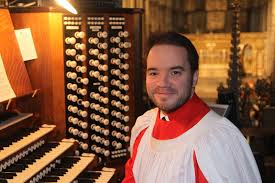DANIEL COOK 20 July 2015
Each year this series delivers a number of enjoyable concerts by experienced organists, many of whom are employed by cathedrals and larger churches. Some of these organists are great entertainers, some have a real gift of communication with the audience and some demonstrate great technical ability or particular gifts of registration and expression. Every now and again an organist displays all of these qualities. Tonight was one such occasion.
Daniel Cook, sub-organist of Westminster Abbey, presented a highly enjoyable programme which favoured the Romantic and Neo-Romantic repertoire. From the beginning he developed a wonderful rapport with his audience which combined humour and gentleness with enthusiasm for and knowledge of the music he was to perform.
Parry’s Fantasia and Fugue in G opened the proceedings in grand style. Daniel’s performance left no-one in any doubt that the concert was to be an exciting one. His ability to use a wide range of registration from the largest choruses to more subtle combinations, coupled with a lightness of touch despite the heaviness of this organ’s action was to be a hallmark of the whole evening’s programme. This piece was written in 1877, the year of construction of the All Saints Willis.
Two movements from Whitlock’s Sonata in C minor followed, providing a lovely contrast to the bombastic opening piece. Here some of the organ’s beautiful flutes and strings were to the fore. Rhythms and articulation were well handled. Prelude & Angels Farewell (Dream of Gerontius) by Elgar, in an arrangement by Brewer, effectively demonstrated the orchestral use of this instrument.
William Lloyd Webber’s Benedictus allowed Daniel to demonstrate how the organ can be used to build a great crescendo, here based around the Diapasons, but also incorporating Mixtures and Reeds. Further music by Whitlock brought the first half to a close. The March:Dignity & Impudence (transcribed by Riley) is a witty pastiche reminiscent of Elgar’s Pomp & Circumstance marches and was delivered with apparent ease!
The second half included a beautifully rhythmic Scherzetto by Jongen and Meditation by Vierne. As before these pieces were performed with real feeling and demonstrated Daniel’s expert handling of this particular organ and acoustic. Dupre’s transcription of Bach’s Sinfonia from Cantata No 29 was an exciting conclusion to the main concert. This once again showed the possibility of combining speed, “big” registration as well as quieter passages with good articulation and control.
Another piece by Bach had opened this half. Toccata, Adagio & Fugue has to be one of Bach’s most satisfying organ works with its contrasts of texture, speed and registration. This, for me, was the overall highlight in a concert which contained many gems. I have never before heard a performance of this piece which even included a very effective echo effect in the extended solo pedal passage. The whole piece was presented in an exciting but controlled and highly musical way.
A short Elegy by Parry as an encore brought us full circle to the composer with which the concert began.
This was an outstanding concert. I hope this will not be Daniel Cook’s last visit to Hastings.

